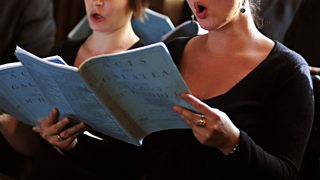Captivating Concertos at the Proms
A concerto is the term used when one (occasionally more than one) instrument takes centre stage whilst accompanied by an ensemble or orchestra.
Typically three movements long, a concerto can really show off the chosen instrument and usually dazzles and delights in equal measure.
Here is a handful of outstanding Concerto highlights from this year's season, performed on instruments big and small by world-class musicians.
1. Rachmaninov: Piano Concerto No.2

Rachmaninov: Piano Concerto No.2, 2nd mvt
With pianist Nikolai Lugansky and St Petersburg Philharmonic conducted by Yuri Temirkanov
Here is what could quite possibly be one of the most moving movements from a concerto ever heard. Concertos aim to show off great technical skill in the performer - often we think of difficult pieces as containing loads of notes to be played as fast and as accurately as possible, but the delicacy and emotional expression involved in a movement such as the second movement of requires superb skill.
.
2. Nielsen: Clarinet Concerto
This was the last work that Danish composer Carl Nielsen wrote for orchestra. Instead of the typical three movements that feature in a standard concerto, this is one, long movement, not giving the musicians much chance to take a breather!
.
3. Guy Barker: The Lanterne of Light

Guy Barker: The Lanterne of Light
Keith Lockhart conducts the Βι¶ΉΤΌΕΔ Concert Orchestra with Alison Balsom (trumpet).
In 1409–10 The Lanterne of Light (an anonymous English tract) provided a classification system based on the Seven Deadly Sins, establishing that each sin had an associated demon, responsible for implementing its temptations among the human race. of the same name is as much about the character of the demons as the human manifestation of those sins. It is arranged in five sections: Before the Fall; The Abyss; Green-Eyed Monsters (Envy and Greed); A Very Basic Instinct; Rant and Rave.
.
4. Beethoven: Triple Concerto
Not one, not two, but three solo instruments to the fore! Beethoven's Triple Concerto showcases the violin, cello and piano in one lovely work. Beethoven solved the issue of the deep tones of the cello getting swamped by allowing the instrument to take the lead, not least in the ravishing slow movement. As Beethoven stressed to his publishers in 1808, the combination of piano trio and orchestra was a novel one.
This piece was performed in Prom 44, .
.
5. Mozart: Piano Concerto No.23

Mozart: Piano Concerto No.23, 2nd mvt
With Maria-JoΓ£o Pires and the Chamber Orchestra of Europe, conducted by Bernard Haitink.
Apparently once, when Mozart was playing the piano in front of an audience he thought weren't paying enough attention, he suddenly broke off, executed a few cartwheels, dived under the table and abruptly left. When hearing a movement as priceless as this, it is almost unbelievable to imagine this happening! The first movement to Mozart's Piano Concerto No.23 is a jolly, happy little number and in no way prepares you for the delicate, emotional, heart-rending despair that this second movement delivers. Mozart wrote no fewer than 27 Piano Concertos, several of which have been celebrated at this year's Proms with beautiful performances like this, by one of the greatest Mozart interpreters of her generation - Maria-João Pires.
6. Korngold: Violin Concerto
An exile in Hollywood in 1938, Erich Korngold gave up writing anything other than music for the movies until Hitler was overthrown. So in 1945, with the Nazis defeated, he set to work on this . ‘More corn than gold’ came a cruel New York paper review after the premiere. We can now hear the work for what it is – a lush concerto that’s not afraid of a good melody, as Nicola Benedetti demonstrates.
.
If you liked this, try these...
-
![]()
Discover an outstanding piece of music every day through our selection of the highlights from the Proms. New every day.
-
![]()
Don't miss the cutting edge contemporary works and exclusive world premieres taking place throughout this year's Proms.
-
![]()
A selection of Proms choral highlights that are good for ears and the soul.
-
![]()
From exuberance to the tradition, here is why we love the Proms.




